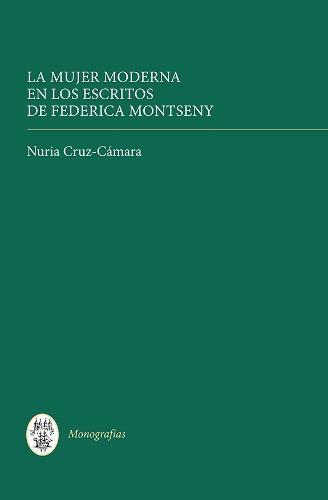Overview
Este libro explora la representacion de la mujer moderna en los escritos de Federica Montseny (1905-1994), prominente lider anarquista espanola en las decadas de 1920 y 1930. This book explores the figure of the modernwoman in the writings of Federica Montseny (1905-1994), a prominent Spanish anarchist leader during the 1920s and 1930s. Este libro explora la representacion de la mujer moderna en los ensayos y la ficcion de Federica Montseny (1905-1994), lider anarquista espanola de gran prominencia en las decadas de 1920 y 1930. Se examinan en profundidad sus escritos sobre la cuestion de la mujer a la luz de las premisas filosoficas que sustentan el ideario del anarquismo. Ademas, su ficcion mantiene un complejo dialogo con los discursos cientificos y culturales de genero que pn durante las primeras decadas del siglo XX. La mujer moderna de Montseny no consiste en una figura unica, finalizada y estatica, sino que se desplaza entre una diversidad de articulaciones a veces contradictorias, pero que reflejan por igual sus creencias anarquistas. Montseny, quien gozo de enorme popularidad en su epoca como escritora y politica, elaboro y disemino algunas de las propuestas sobre la emancipacion de las mujeres mas originales do, y este volumen es el primero en situar su pensamiento como una de las piezas fundamentales en la evolucion del feminismo espanol. Nuria Cruz-Camara es Profesora Titular en la Universidad de Tennesse. This book explores the figure of the modern woman in the essays and fiction of Federica Montseny (1905-1994), a prominent Spanish anarchist leader during the 1920s and 1930s. It examines in depth the author's theories of genderin light of the basic principles of anarchist political thought and philosophy. In addition, Montseny's novels are shown to engage in an elaborate and critical dialogue with scientific and cultural discourses on women that proliferated during the first four decades of the 20th century. Montseny's ideal modern woman is not a static and definite figure; rather, she shifts across different and at times contradictory articulations that, nonetheless, all fall within her anarchist beliefs. Montseny, a popular politician and writer during her time, developed and disseminated some of the most original concepts dealing with women's emancipation and gender theory, and the present volume is the first to situate her thought as a key component within the evolution of Spanish feminism.. Nuria Cruz-Camara is Professor of Spanish at the University of Tennessee.
Full Product Details
Author: Nuria Nuria Cruz-Camara (Person)
Publisher: Boydell & Brewer Ltd
Imprint: Tamesis Books
Volume: v. 347
Dimensions:
Width: 15.60cm
, Height: 2.10cm
, Length: 23.40cm
Weight: 0.552kg
ISBN: 9781855662940
ISBN 10: 1855662949
Pages: 206
Publication Date: 16 April 2015
Audience:
College/higher education
,
Undergraduate
,
Postgraduate, Research & Scholarly
Format: Hardback
Publisher's Status: Active
Availability: In Print

This item will be ordered in for you from one of our suppliers. Upon receipt, we will promptly dispatch it out to you. For in store availability, please contact us.
Language: Spanish
Author Information
NURIA CRUZ-CAMARA Associate Professor of Hispanic Studies and Director of Graduate Studies in the Department of Modern Foreign Languages and Literatures of the University of Tennessee




